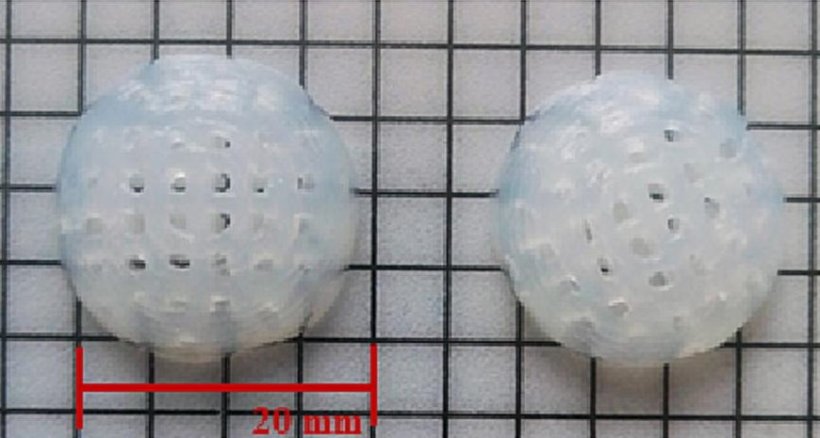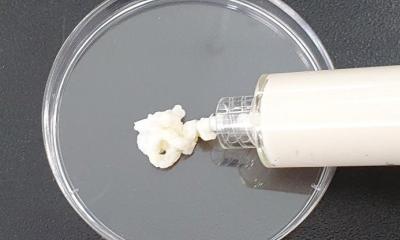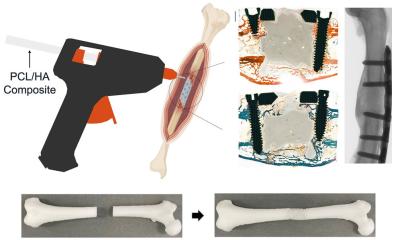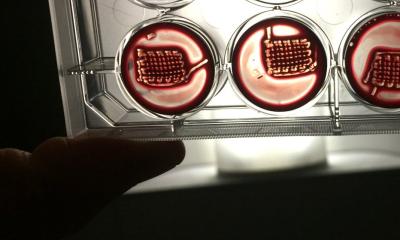
Image source: Moroni et al., International Journal of Pharmaceutics 2023 (CC BY 4.0)
News • Size-changing and personalised
Researchers create 4D printed implants for efficient breast cancer management
Researchers from Queen’s University Belfast have created personalised 4D printed “smart” implants for breast cancer management. This is the first time that 4D printing has been used for the manufacturing of breast cancer implants.
These multipurpose new implants are programmed to change size to better fit within the breast cavity, resulting in personalisation to an individual’s body, therefore, improving aesthetic and confidence outcomes for those who have or have had breast cancer. The implants also have the ability to release chemotherapy drugs. The chemotherapeutic molecule will protect the patients from the return of the cancer cells in the area.
The research has been published in the International Journal of Pharmaceutics.
The study was conducted by a team from the School of Pharmacy at Queen’s University Belfast led by Professor Dimitrios Lamprou, Chair of Biofabrication and Advanced Manufacturing, and includes Dr Niamh Buckley, Reader from the School of Pharmacy; Sofia Moroni, PhD student from the School of Pharmacy at Queen’s and the University of Urbino Carlo Bo in Italy; and Rachel Bingham, a PhD students from the School of Pharmacy at Queen’s. The research team collaborated with Professor Luca Casettari from the University of Urbino Carlo Bo in Italy.
The breast cavity after surgery can be covered with an implant that mimics the elasticity of the breast and provide better management of the breast cancer by releasing a chemotherapeutic drug that will “keep away” the return of the tumour
Dimitrios Lamprou
Breast cancer is the second most common cancer worldwide, especially among the female population. According to the World Health Organization (WHO), more than 2.3 million cases occur each year and around 30% of cases die from the disease; making it the most common cancer among adults. Around 1,400 women in Northern Ireland are diagnosed with breast cancer every year.
Emerging technologies, such as 4D printing, present an opportunity to improve management of breast cancer through the development of smart implants. 4D printing is the manufacturing of dynamic 3D printed objects that are able to change their morphology and/or characteristics. These changes are predictable and programmable, and are enabled by one or more external stimuli, such as the variation in the pH, temperature, humidity, light, or the presence of a magnetic field. Common transformations are related to shape-shifting abilities, such as folding, bending, twisting, expansion, and shrinkage, while property changes include the colour, the stiffness, and the swelling ratio. This is achieved by using stimuli-responsive materials, also called “smart materials”.
The research team manufactured implants via a 4D bioprinter which contains doxorubicin that enables the implants to change size to better fit within the breast cavity. Due to the small size of these new breast implants they are also more affordable and easier to manufacture, meaning they can be prepared in hospitals for direct and personalised treatment, which reduces costs and provides better options for patients.
Commenting on the importance of this innovative research, Professor Dimitrios Lamprou, lead on the project and Chair of Biofabrication and Advanced Manufacturing from the School of Pharmacy at Queen’s University Belfast, said: “This innovative idea started after discussions with doctors and patients, explaining us the challenges in operation, management and everyday life. By making, for first time, these 4D printed implants, the breast cavity after surgery can be covered with an implant that mimics the elasticity of the breast and provide better management of the breast cancer by releasing a chemotherapeutic drug that will “keep away” the return of the tumour.”
Dr Niamh Buckley, Reader from the School of Pharmacy and responsible for the in vitro evaluation of these novel implants, said: “Chemotherapy plays a crucial role in the treatment of breast cancer, but it is associated with harsh side effects. The use of technology such as this, which allows a concentrated delivery of the drug just to where it is needed, can help make treatment more effective and kinder.”
Source: Queen's University Belfast
08.07.2023











